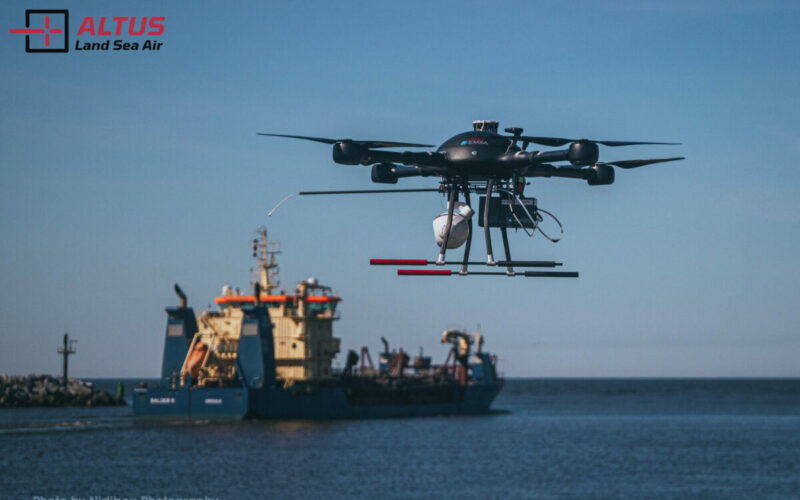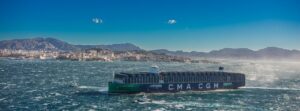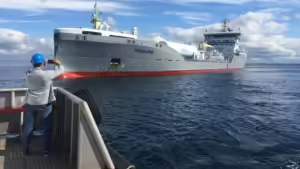The Port of Klaipėda has successfully monitored 140 ships for exhaust gas quality along Lithuania’s Baltic Sea coast and port waters as part of a three-month drone mission.
The operation was supported by the European Maritime Safety Agency (EMSA) and led by national institutions, including the Environmental Protection Department, Klaipėda State Seaport Directorate, and the Fisheries Service.
READ: EMSA deploys drones for vessel emissions monitoring
The port authority assigned the unmanned drone a mission to conduct surveillance of the waters in the Port of Klaipėda, monitor ship movements, measure the sulphur content in ship exhaust emissions, and document instances of water pollution.
“While participating in this project and having the opportunity to use modern tools, we evaluated ship emissions and the impact of loading processes on the environment,” said Algis Latakas, Director General of the Klaipėda State Seaport Directorate.
“During the project, the harbour water area was directly monitored by drone. The available results of the observations made during the mission will allow us to make the most effective decisions on how to prevent possible violations, should they occur.
“Our priority goal is to make the port as environmentally friendly as possible. When implementing the concept of a green port, we have planned environmental protection measures, that will help to go in the direction of ‘greening’,” Latakas added.
READ: Port of Rotterdam launches remote-controlled drone project
The unmanned aircraft flew five days a week in the Port of Klaipėda and in the Baltic Sea looking for possible violations of environmental protection.
Flying at the harbour gates, the drone studied exhaust gases of every ship entering the harbour. The drone’s sensor was able to determine the percentage of sulphur in the ship’s fuel.
“In Lithuania, the implementation of international and national agreements on ships is controlled by the Marine Environmental Protection Inspection,” said the Chief Specialist of the Marine Environmental Protection Inspection Gintarė Šešplaukė.
“We are glad that with the help of modern technology we were able to check the sulphur content of the fuel of every ship entering the port, 140 ships were checked, seven exceedances were recorded by drone – after conducting inspections on two ships, the exceedances were not confirmed.
“The possible violations of the other five ships were recorded after leaving the port, therefore, the administrations of the flag states were informed in order to initiate inspections,” Šešplaukė added.
READ: Port of Immingham welcomes new cargo service to Lithuania
The drones were equipped with a sensor to calculate the amount of sulphur in exhaust gas, a range finder, GPS coordinate locator, as well as usual and infrared cameras to detect oil stains in water during the day and night.
The footage captured by the drone cameras was recorded and broadcasted live to the inspectors involved in the project.
At least one day a week, the unmanned aircraft performed preventive flights over the Klaipėda port water area. These included monitoring the port’s waters for possible cases of pollution by oil products, as well as loading operations for the possible fall of cargo particles into the water, and monitoring ship repair work, waste transfer operations, and the movement of ships in the port.
More recently, methanol producer, Proman, signed a Memorandum of Understanding (MoU) with the Port of Klaipėda to help with methanol fuel systems.









